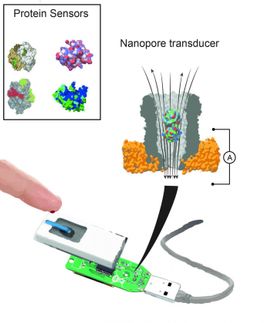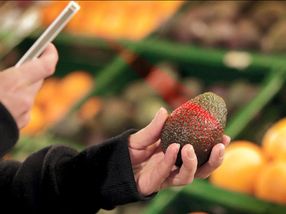Treating Cocaine Addiction with Viruses
La Jolla: Scientists at The Scripps Research Institute have designed a potentially valuable tool for treating cocaine addiction by creating a modified "phage" virus that soaks up the drug inside the brain.
They coated the virus with an antibody that binds to molecules of cocaine and helps to clear the drug from the brain, which could suppress the positive reinforcing aspects of the drug by eliminating the cocaine high.
"Typically one would think of a virus as a bad entity," says principal investigator Kim D. Janda, Ph.D., who holds the Ely R. Callaway, Jr. Chair in Chemistry and is an investigator in The Skaggs Institute for Chemical Biology at Scripps Research. "But we are taking advantage of a property it has-the ability to get into the central nervous system."
The structure and design of the virus and its effect in rodent models are described in an article that will be published in an upcoming issue of the Proceedings of the National Academy of Sciences.
Cocaine's Costs to Society
Americans spend more on cocaine, a chemical extracted from the leaf of the Erythroxylaceae coca plant, than on all other illegal drugs combined, says a White House Office of National Drug Control Policy study that came out in the mid-1990s. The study estimates that $38 billion was spent on cocaine in the years 1988 to 1995 alone.
Cocaine's secondary costs to society due to cocaine treatment and prevention programs, emergency room visits and other healthcare costs, lost job productivity, lost earnings, cocaine-related crime, and social welfare are estimated to be in the billions of dollars annually-not to mention the drug's human toll. According to the National Institute on Drug Abuse (NIDA), about 1.7 million people regularly use cocaine in the United States-a population larger than that of the city of Philadelphia-and cocaine is the leading cause of heart attacks and strokes for people under 35.
Once in the bloodstream, cocaine crosses the blood-brain barrier and accumulates rapidly in the ventral tegmental area of the brain. This area is connected by nerve cells to the nucleus accumbens, the so-called pleasure center of the brain. There, the cocaine molecules interfere with the normal regulation of dopamine by binding to dopamine transporters and blocking them from recycling the neurotransmitter.
This leads to the build-up of dopamine in the brain's pleasure center, which produces a euphoric feeling in the user-a quick rush that hits seconds after the user takes the drug and lasts several minutes.
Relapse, unfortunately, is a reality for many addicts. Part of the basis of relapse may be the strong positive reinforcement of the high-doing the drug is so enjoyable for addicts that they are conditioned to return to it.
Using Viruses in the Battle Against Cocaine
Several years ago, Janda and his colleagues designed an antibody that was able to bind to cocaine. If the antibody was present in the bloodstream, it would soak up the cocaine like a sponge and prevent it from entering the central nervous system where the drug exerts its narcotic effect. As a molecule, cocaine is easily degraded by the body's natural chemistry, and the sequestered cocaine would eventually disappear.
While this strategy was partially effective, the ability of the antibody to curtail cocaine's effect proved to be limited in animal studies. The antibody could not cross the blood-brain barrier and cocaine could. In laboratory models, a large dose of cocaine molecules could overwhelm the antibodies in the blood, doing an end-run around them and leaking into the brain.
A few years ago, Janda and his graduate students Rocio Carrera and Gunnar Kaufmann decided they wanted to target the cocaine antibodies into the brain. That's when they set out to create a new form of virus. This was done with collaborators Jenny Mee and Michael Meijler in the Department of Chemistry and Professor George Koob in the Department of Neuropharmacology and the Pearson Center For Alcoholism And Addiction Research at Scripps Research.
The reserachers used filamentous phage-a type of virus that infects bacteria-for the study. They inserted DNA encoding an antibody that binds cocaine into the phage's genetic code. When the modified phage were grown, they had hundreds of these antibodies displayed on their surfaces.
Phage particles, like many types of viruses, have the ability to enter the brain through the internasal passageway. Janda, Carrera, and Kaufmann used this ability to deliver their antibody into the central nervous system. The current study demonstrates the ability of the antibody/phage to reduce one effect of cocaine in rodent models (increased locomotion).
A similar technique could potentially be used for treating the positively reinforcing aspects of the drug in humans, say the scientists, but they cautioned that such an approach has not been tested clinically and that even if proven safe and effective it would be years before any such therapy were available to patients.
The technique of displaying therapeutic proteins or peptides on phage particles could be useful as a general way of delivering therapies into the brain
The research article "Treating cocaine addiction with viruses" is authored by M. Rocio A. Carrera, Gunnar F. Kaufmann, Jenny M. Mee, Michael M. Meijler, Kim D. Janda, and George F. Koob and is being published online the week of June 21 - 25, 2004 by the journal Proceedings of the National Academy of Sciences. It will appear in a printed issue of PNAS later this year. See http://www.pnas.org/cgi/doi/10.1073/pnas.0403795101
This research was supported by the National Institute on Drug Abuse and The Skaggs Institute for Chemical Biology at The Scripps Research Institute.
Other news from the department science
Most read news
More news from our other portals
See the theme worlds for related content
Topic world Antibodies
Antibodies are specialized molecules of our immune system that can specifically recognize and neutralize pathogens or foreign substances. Antibody research in biotech and pharma has recognized this natural defense potential and is working intensively to make it therapeutically useful. From monoclonal antibodies used against cancer or autoimmune diseases to antibody-drug conjugates that specifically transport drugs to disease cells - the possibilities are enormous

Topic world Antibodies
Antibodies are specialized molecules of our immune system that can specifically recognize and neutralize pathogens or foreign substances. Antibody research in biotech and pharma has recognized this natural defense potential and is working intensively to make it therapeutically useful. From monoclonal antibodies used against cancer or autoimmune diseases to antibody-drug conjugates that specifically transport drugs to disease cells - the possibilities are enormous
























































